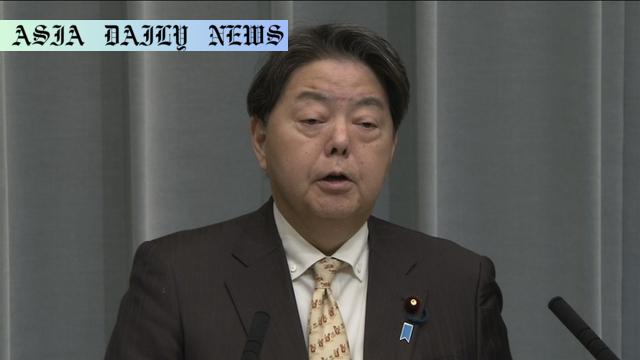Japan government highlights focus on tariff talks amidst social media commentary.
- Japan’s Chief Cabinet Secretary refrains from commenting on Trump’s post.
- The country prioritizes ongoing tariff negotiations with the US.
- Government remains focused on substantial economic goals over social media controversies.

Japan Maintains Silence on Controversial Trump Comment
Japan’s Chief Cabinet Secretary, Hayashi Yoshimasa, has recently chosen not to weigh in on an intriguing statement made by US President Donald Trump. This statement, referred to as the ‘bowling ball test,’ has attracted attention across social and traditional media. However, Japan’s government has made it clear that their focus lies elsewhere, using this opportunity to reiterate their commitment to critical diplomatic and economic strategies. Hayashi addressed the issue during a Monday press briefing, indicating that while they are aware of the social media chatter, they have no intention of responding to every trivial post or provocative claim.
In the face of challenges that such commentary may pose to media relations and public perception, Japan’s diplomatic response exemplifies a strategic restraint. As an emerging economic powerhouse, Japan consistently prioritizes collaborative goals over unnecessary distractions. Hayashi’s statement reflects a deeper focus on substantial matters that impact the country’s economic future.
Ongoing Tariff Negotiations Take Center Stage
At the core of Japan’s current economic agenda lies its commitment to resolving tariff-related concerns with the United States. Last week, representatives from both nations engaged in significant discussions aimed at mutual economic benefits. Recent statements from Tokyo underline how this diplomatic engagement underscores a prioritization of serious negotiations over mere rhetoric or frivolous narratives.
By choosing not to comment on Trump’s controversial remarks, Japan signals its intention of maintaining meaningful partnerships with key global players while simultaneously pursuing national interests. The government’s approach to prioritizing macroeconomic issues over engaging in tit-for-tat responses is noteworthy, reflecting a mature focus on long-term prosperity.
Building Durable Partnerships
As global economies strive for stability amidst the ongoing geopolitical tensions, Japan’s steadfast approach highlights its readiness to emerge as a stable and pragmatic member of the international community. Its commitment to bilateral negotiations signifies the emphasis on diplomacy as opposed to distractions caused by social media commentary. Japan’s tough stance reaffirms its position as a robust collaborative partner while countering unnecessary interruptions in the way of progress. Alongside concentrating on policymaking, the government illustrates a commendable balance between addressing public queries and refraining from giving heed to every external provocation, steering away from irrelevant speculations.



Commentary
The Balancing Act of Strategic Diplomacy
The Japanese government’s decision to refrain from commenting on President Trump’s social media post reveals an approach that prioritizes strategy over sensationalism. Given the volatile nature of international dialogue, this decision reflects a degree of emotional intelligence and unwavering focus on long-term objectives.
In today’s interconnected world, every comment or reaction has the potential to spark disputes or affect international relations. By choosing not to engage in trivial matters, Japan highlights its commitment to diplomacy and constructive dialogue. This opens the door to substantial economic discussions, manifesting respect for the collaborative efforts made during repetitive negotiations, aligning both nations with mutual benefits while strengthening their economic ties.
The Road Ahead in Bilateral Relations
Japan and the United States’ focus on resolving tariff disputes symbolizes a high level of maturity in handling bilateral relations. The progress observed in last week’s discussions creates a foundation for more robust and productive collaboration in the future. By confronting the roots of the problems—economic disparities rather than diplomatic emotions—this move creates room for sustainable and fruitful legislation. Amidst the buzz of social media, Tokyo stands strong in its resolve, leading by example, and avoiding unnecessary conflicts that could derail productive talks.
In essence, this is a testament to Japan’s modern diplomatic philosophy. It reinforces that actions—like achieving progress in tariff negotiations—speak louder than words and reactions. This poise ultimately cements Japan’s position as a measured, responsible voice in a world increasingly dominated by impulsive debates and digital provocations.